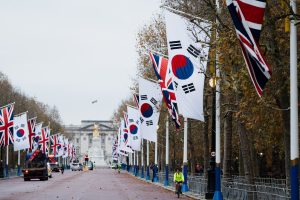When then-U.K. Prime Minister Boris Johnson outlined the “tilt to the Indo-Pacific” in the 2021 Integrated Review of the United Kingdom’s national security and foreign policy, few would have expected that one of the eventual outcomes of this policy shift would result in the Royal Navy commencing joint patrols with the Republic of Korea (ROK) Navy to enforce non-proliferation sanctions on North Korea.
Yet, such an arrangement was merely one of several potentially groundbreaking agreements that U.K. Prime Minister Rishi Sunak and South Korean President Yoon Suk-yeol announced in late November when they signed the Downing Street Accord, a “Global Strategic Partnership” between the two countries.
Given Britain’s continued tilt to the Indo-Pacific and South Korea’s own deepening security relations with Europe, it would be mutually beneficial for both to forge an institutionalized agreement, modeled upon the Japan-U.K. Reciprocal Access Agreement (RAA), that would permit the stationing of forces in each other’s territories. By allowing the continual posting of British troops in South Korea and South Korean forces in Britain, South Korea-U.K. military exchanges would empower Britain in the Indo-Pacific and greatly bolster South Korea’s growing security relations with Europe and the rest of NATO.
Johnson developed the tilt to the Indo-Pacific as a pillar of his government’s post-Brexit foreign policy. This strategic repositioning resulted in the formation of the AUKUS alliance with the U.S. and Australia, the RAA negotiations with Japan, and increasing Royal Navy deployments in the region, including with its Carrier Strike Group. Despite Johnson’s dramatic downfall, the tilt remains in effect and is poised to continue even under a new Labor-led government, with Labor Party insiders noting that there remains more potential for a stronger South Korea-U.K. relationship.
Similarly, under the presidency of Yoon, South Korea has grown closer to Europe and the rest of NATO. While South Korean arms exports, defense trade, and R&D collaboration with Europe was already steadily rising in the past few decades, Russia’s invasion of Ukraine supercharged these dynamics, resulting in exponential increases to its arms deals with European states. Due to the large rise in South Korean military technologies in Europe, South Korea even began holding joint military exercises with arms recipients, such as the Autumn Fire exercise in Poland. Political dialogue with NATO has significantly increased as well, including the opening of a South Korean Mission to NATO in Brussels, and Yoon’s attendance at the NATO 2022 and 2023 Summits in Madrid and Vilnius, respectively.
All these factors contributed to Yoon’s state visit to the U.K. and the signing of the Downing Street Accord. The cooperation that the Downing Street Accord enables between Britain and South Korea is impressive, including collaboration on developing cybersecurity, space security, telecommunications, semiconductor, AI, and clean energy capabilities beyond the joint naval patrols.
However, neither the U.K. nor South Korea should rest on their laurels, as an RAA is worth consideration. To begin with, if the Royal Navy could be based in South Korea on a semi-permanent basis under an RAA, it would be able to conduct the joint sanctions enforcement patrols with the ROK Navy much more frequently, along with easing other military deployments in the Indo-Pacific, like its upcoming 2025 Carrier Strike Group deployment to the region. An RAA would additionally make it easier for the Royal Navy to conduct blue-water naval training exercises with the ROK Navy, an idea of great appeal to South Korea due to its decades-long aspiration to develop a blue-water navy (a globally-reaching navy). The Downing Street Accord already specifically mentions the possibility of more collaboration in maritime security, complementing the objectives of such an RAA.
Likewise, a contractor for the forthcoming ROK Navy’s CVX-class aircraft carrier is the U.K.-based Babcock International, one of the companies that contributed to the construction of both of the Royal Navy’s Queen Elizabeth-class aircraft carriers. An RAA would make it easier for the Royal Navy to potentially innovate new military technologies for its own carriers in collaboration with the ROK Navy based on the CVX’s construction.
For South Korea’s security presence in Europe, easing the stationing of troops in the U.K. would enable greater collaboration with not only the U.K. military, but other European members of NATO. Much as South Korea and Poland conducted the joint Autumn Fire military exercise, South Korean units could conduct joint exercises more regularly with the U.K. and other NATO allies in Britain under an RAA, increasing interoperability between them. It would ensure that NATO forces would gain an even greater familiarity with South Korean military technologies beyond the ones acquired by NATO members through arms deals, while future technologies could be developed to become closer to NATO standards.
A further area of potential cooperation is space security. Following North Korea’s successful launch of a spy satellite with the likely help of Russia and its announced intention to launch even more, South Korea has become increasingly concerned about the emergence of space as a security domain. The Royal Air Force and ROK Air Force have already negotiated Terms of Reference for cooperation in space, with the Downing Street Accord promising to negotiate a more comprehensive Memorandum of Understanding (MOU) on Space Cooperation. If this MOU were to have a military aspect, the development of an RAA would make it much easier for the U.K. and South Korea to share core aerospace technologies and increase technological interoperability for space security, especially for satellite defenses.
The Downing Street Accord should therefore mark the beginning, not culmination, of a new level of cooperation between Britain and South Korea. An RAA would not only institutionalize the growing bilateral cooperation between the U.K. and South Korea, but also ensure that Britain can continue to grow its security presence in the Indo-Pacific while South Korea can do the same in Europe.

































